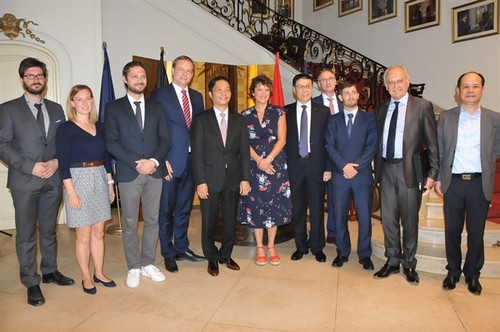 Minister of Industry and Trade Tran Tuan Anh (fifth from left) meets European business people on June 18. (Photo: VNA/VNS) Minister of Industry and Trade Tran Tuan Anh (fifth from left) meets European business people on June 18. (Photo: VNA/VNS) |
VOV reporter: What has been Vietnam’s role during negotiation of the EVFTA?
Minister Tran Tuan Anh: It is important to note that Vietnam hosted the talks on technical issues, which involved multiple demanding requirements. It took Vietnam 9 years to achieve the outcome, although the actual time of negotiation was 5 to 7 years. That achievement required the involvement of the entire political system, especially state management agencies, negotiation delegations, and the government, ministries, and business community.
Secondly, in terms of Vietnam’s negotiations with EU countries, the 28 EU members and Vietnam vary considerably in their level of economic development. They differ in language, culture and even economic management ability. To be able to get to this stage, Vietnam has had to relieve all the EU’s worries and find a “win-win” solution that shares the successes and advantages equitably.
VOV reporter: When the EVFTA is signed and approved, what specific benefits will Vietnam and the EU receive?
Minister Tran Tuan Anh: Tariffs imposed on Vietnamese and EU exports will be almost entirely eliminated within 7 years from the effective date, 85.6% of them in 2020 if the agreements are approved in late 2019.
The EVFTA is a comprehensive agreement covering all spheres of trading, service, investment, preferential conditions on Government procurement, trade protection, and preferentiality for small and medium-sized enterprises and intellectual property.
Once the deal comes into force, Vietnam will not only boost two-way trade with the EU but will have new opportunities to increase its competitiveness and expand its economic capacity, particularly by forming value chains with new key partners.
EVFTA will also solidify Vietnam’s position in the international arena as a great contributor and a responsible nation for the development of globalization in the direction of trade liberalization and favorization.
VOV reporter: Currently 27 EU members have invested in nearly 3,000 projects in Vietnam with total registered capital of approximately 45 billion USD. What opportunities will EU businesses have in the Vietnamese market after the EVFTA is signed?
Minister Tran Tuan Anh: Both the EVFTA and EVIPA will be signed this Sunday. In terms of attracting investment from the EU after the two agreements are signed, the investment environment and business conditions in Vietnam for European enterprises will be remarkably improved. A number of major issues related to investment protection and investment disputes will be addressed in line with international laws and the laws of Vietnam and the EU.
As a result, we strongly believe that European investors will be the first to make their way to the Vietnamese market as soon as the agreements are signed. An investment surge from Europe is anticipated.
European firms will be incentivized to continue to invest in industries in Vietnam such as food processing, high tech, and key sectors such as automobile production, electronics, and auxiliary industries.
In addition to working with the Vietnamese market of 100 million people, through other agreements signed between Vietnam and partner countries, European investors can also access the 660 million strong markets in ASEAN and CPTPP members.
VOV reporter: However, it's not always easy to take advantage of free trade agreements. What will be the challenges that Vietnam will face?
Minister Tran Tuan Anh: When we open the market, we must accept fierce competition which will create difficulties for small and medium sized enterprises whose scale, capital, technology, and human resource are still limited. So we have to work out ways to help our businesses overcome these challenges to increase their competitiveness and develop sustainably. The government also needs to work out action programs in the near future.
VOV reporter: Thank you for the interview.